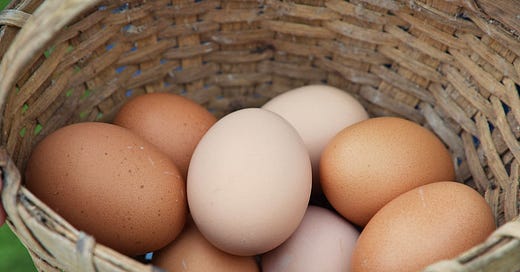$5 Eggs and the Gift of Productivity
There may be a silver lining in the eggs which are now worth their weight in gold.
A dozen eggs now cost five dollars at my local grocery store. I would complain, but given that some people are reporting nine dollar eggs, it seems like a better idea to just shut up, be grateful, and ration the eggs I do have.
An even better move would be to consider how smart my neighbor John* was when he set up his own little farm on his city property, complete with chickens, bees, and—I kid you not—goats. It’s winter, and I haven’t talked to him lately, so I don’t know whether his hens are producing right now, but if they are, I’m sure he’s feeling a lot like this guy right about now:


But John’s farming efforts are producing more than golden eggs. He is producing for himself—or preserving, rather—the ideal of home life.
Such an ideal, author Wendell Berry writes in his book, The Gift of Good Land, is highly appealing to many of us, and was once the norm and necessity of life. He depicts “home life” as the ability to grow and produce our own food, to engage in hard, healthy work side by side with our family members, thus “strengthen[ing] the bonds of interest, loyalty, affection, and cooperation that keep families together.”
This ideal to produce, however, has been corrupted by the push for consumerism, to buy and gain, to “blatantly … supplant the joy and beauty of health with cosmetics, clothes, cars, and ready-made desserts,” Berry writes.
We’ve all felt that urge, and unfortunately, may feel it now more than ever, as our ability to consume sits disguised in our homes as a cell phone or laptop, waiting for us to browse Amazon, hit the purchase button, and have the gratification arrive on our doorsteps via two-day shipping.
Berry suggests that we “shut out the racket of consumption” by valuing the things we have around us—home and yard and community and people—looking for ways we can begin to produce, even in small ways. “These possibilities exist everywhere in the country or in the city,” Berry writes, “it makes no difference.”
They are now most often lived out in home gardens and kitchens, libraries, and workrooms. But they are beginning to be worked out, too, in little parks, in vacant lots, in neighborhood streets. Where we live is also a place where our interest and our effort can be. But they can’t be there by the means and modes of consumption. If we consume nothing but what we buy, we are living in ‘the economy,’ in ‘television land,’ not at home. Any way at all of joining and using the air and light and weather of your own place—even if it is only a window box, even if it is only an opened window—is making and a having that you cannot get from TV or government or school.
That local productivity, however small, is a gift. If we are parents we cannot help but see it as a gift to our children—and the best of gifts. [Emphasis added.]
The price of eggs—the price of everything really—can be pretty depressing. But as I reflect on Berry’s words, I can’t help but wonder if such price pain isn’t better for us in the long run, for it will make us reconsider our ability to do our own producing on our own properties and in our own communities, even in the smallest of ways. And the more we attempt to become our own producers, the more we will restore our lost ties with family, work, and fellowship.
In my book, that’s worth the price of a five dollar carton of eggs.
*Names have been changed.
—
Image Credit: Flickr-United Soybean Board, CC BY 2.0




Excellent article, and Wendell Berry had it right all along.
🐥 ⋆ 🐔 🎀 𝒜𝓃𝓃𝒾𝑒 - 𝓈𝓂𝒶𝒸𝓀-𝒹𝒶𝒷 ☯𝓃 𝓉𝒶𝓇𝑔𝑒𝓉, 𝒶𝓈 𝓊𝓈𝓊𝒶𝓁❣ 𝒜𝐼𝒢 - 𝒜𝓂𝒶𝓏🏵𝓃 𝐼𝓃𝓈𝓉𝒶𝓃𝓉 𝒢𝓇𝒶𝓉𝒾𝒻𝒾𝒸𝒶𝓉𝒾☯𝓃. 𝒰𝑔𝒽. 𝑀𝑒𝒶 𝒸𝓊𝓁𝓅𝒶. 🎀 🐔 ⋆ 🐥